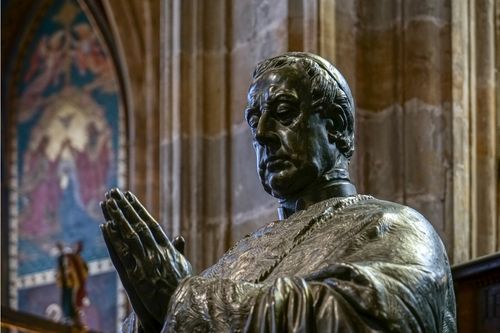Table of Contents
Thinkers in the nineteenth century recognized that the value of something unique, individual, and spontaneous was far greater than that of something that adhered to a particular standard of taste. They sought hidden meanings in things and cultivated them into a system of thoughts. Keep reading to learn about some of the most famous philosophers of the 1900s.
Friedrich Nietzsche

Birthdate- October 15, 1844
Sun sign- Libra
Birthplace- Röcken, Lützen, Germany
Died- August 25, 1900
Friedrich Nietzsche, a German philosopher, cultural critic, composer, and poet, significantly impacted modern intellectual history. He was the University of Basel’s Chair of Classical Philology. His works included philosophical polemics, poetry, cultural criticism, and fiction. He had numerous health issues from a young age and died at 55.
Immanuel Kant
Birthdate- April 22, 1724
Sun sign- Taurus
Birthplace- Königsberg, Germany
Died- February 12, 1804
Another German philosopher was Kant. He contended that the mind creates the structure of human experience. Kant also claimed that human morality is the result of reason, that asceticism results from a faculty of disinterested judgment, and that space and time are forms of our sensibility. He also believed that how the world is is unrelated to how we perceive it. Kant believed that we could achieve everlasting peace through democracy and international cooperation.
Bertrand Russell
Birthdate- May 18, 1872.
Sun sign- Taurus
Birthplace- Trellech, Monmouthshire, Wales
Died- February 2, 1970
Bertrand Russell was a Nobel laureate and British polymath. His work has significantly impacted philosophy, cognitive science, artificial intelligence, mathematics, linguistics, and logic, among other fields. Russell is also regarded as one of the founders of analytic philosophy, and many credit him for leading the revolt against idealism in Britain.
Ralph Waldo Emerson
Birthdate- May 25, 1803
Sun sign- Gemini
Birthplace- Boston, Massachusetts, United States
Died- April 27, 1882
Ralph Waldo Emerson was an American philosopher who led the transcendentalist movement in the 1820s and 1830s in the eastern United States. Many people credit his numerous lectures and essays with popularising individualism. Emerson influenced many subsequent thinkers and writers, including Henry David Thoreau, who became a leading transcendentalist.
Soren Kierkegaard
Birthdate- May 5, 1813
Sun sign- Taurus
Birthplace- Copenhagen, Denmark
Died- November 11, 1855
Soren Kierkegaard was an existentialist philosopher who may have been the first to do so. Kierkegaard’s ideas include the knight of faith, the present age, the Absurd, angst, authenticity, existential despair, and existential philosophy. A knight of faith is someone who has complete confidence in both himself and God.
It enables him to act independently of the outside world. The Absurd refers to the conflict between man’s constant search for meaning and inherent value in life and his inability to find any. Kierkegaard was unquestionably one of the most influential philosophers of the nineteenth century.
Arthur Schopenhauer
Birthdate- February 22, 1788
Sun sign- Pisces
Birthplace- Gdańsk, Poland
Died- September 21, 1860
Another great German philosopher was Schopenhauer. The phenomenal world, according to Schopenhauer, is the result of a blind and insatiable metaphysical will. Schopenhauer was one of the first philosophers to assert that the world was not rational. His most famous concepts included the fourfold root of reason, the hedgehog’s dilemma, will, and philosophical pessimism.
The hedgehog’s dilemma is as follows- a group of hedgehogs wants to huddle up close together to stay warm during the winter. They can’t get too close, though, because their spikes will hurt each other. They all want to be close but can’t do so because of an unchangeable reality. Schopenhauer thought the analogy also applied to human relationships.
Karl Marx

Birthdate- May 5, 1818
Sun sign- Taurus
Birthplace- Trier, Germany
Died- March 14, 1883
Karl Marx was one of the most influential philosophers of the nineteenth century. He is the founder of communism and socialism and one of the few people in history to have started a movement with such a large number of followers and far-reaching consequences. The idea of communism is that the people should own the means of production and that money, social classes, and the state should not exist. Socialism is the belief that people should own the means of production, distribution, and exchange.
Georg Wilhelm Friedrich Hegel
Birthdate- August 27, 1770
Sun sign- Virgo
Birthplace- Stuttgart, Germany
Died- November 14, 1831
Georg Wilhelm Friedrich Hegel, a German philosopher, developed ideas such as absolute idealism, the philosophy of spirit, or Geist, and the master-slave dialectic. Later thinkers and intellectuals, such as Karl Popper and Karl Marx, were influenced by Hegel’s views on civil society.
John Stuart Mill
Birthdate- May 20, 1806
Sun sign- Taurus
Birthplace: Pentonville, London, England
Died- May 7, 1873
John Stuart Mill, a nineteenth-century philosopher, is best known for his work On Liberty, which discussed personal freedom and the ‘harm principle.’ His ‘The Subjection of Women’ was among the first works by a male author to advocate for women’s rights. He agreed with Jeremy Bentham’s ethical utilitarianism. He was an English political economist and civil servant who significantly contributed to social theory, political theory, and political economy.
Key takeaways
- Karl Marx is the first name that comes to mind when discussing some of the most significant 19th-century philosophers. Marx, a German philosopher, developed theories about society, economics, and politics, now known as Marxism.
- Jon Stuart Mill was an English political economist and civil servant who was widely influential in the history of liberalism and made significant contributions to social theory, political theory, and political economy.
- Immanuel Kant was a German philosopher whose works in aesthetics and metaphysics established him as a significant and influential figure in Western philosophy.
Did you find this blog informative? Please let us know your thoughts and views in the comments below. Click here to contact us for more information on famous philosophers of the 1900s. We would be happy to assist you with your queries.
Liked this blog? Read next: Khalil Gibran | The journey of a poet, painter, and philosopher
FAQs
Q1. What were the three popular philosophies of the 19th century?
Answer- Many philosophical schools were present, and they competed in a series of distinct and powerful oppositions: pragmatism versus idealism, positivism versus irrationalism, and Marxism versus liberalism.
Q2. Who is the Father of philosophy?
Answer- Socrates of Athens is one of the most well-known figures in history for his contributions to the development of ancient Greek philosophy, which served as the foundation for all Western philosophy.
Q3. Who is the greatest philosopher in history?
Answer- Aristotle, the third member of the great triumvirate of ancient Greek philosophers after Socrates and Plato, is arguably the most important thinker who ever lived.







